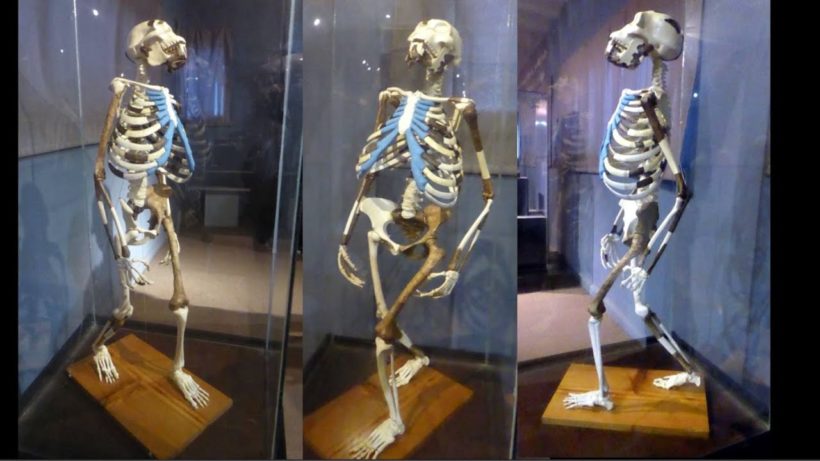I managed to get a government permission to visit the National Museum in Addis Ababa to see my very old sister, “Lucy”. It was only the partial skeleton of a woman about 3,2 million years old, dug out in 1974. The scientists think that she walked upright. She had a height of 1.1 inches and a weight of 65 pounds. She looked so small. I was thrilled to see my very old sister. I wished I could ask her what she enjoyed most, what she was afraid of.
By C. Rothschild
It was 1983, when I was in Addis Ababa as a UN consultant on Women’s Roles in Sheep and Goat Production. The ongoing internal war all over Ethiopia made it most of the time impossible for me to visit the areas I was supposed to. But even in the capital, the scenes were strange with Russian style communism evident everywhere and the huge panels with pictures of Russian revolutionary personalities hung in the city central square.
Life was extremely difficult for a large part of the population. Many people were imprisoned and every day families brought food to their relatives, since the prisons would not provide any.
When I finally was able to travel to the interior of the country, I saw only a few fields cultivated. This was the curse of Ethiopia, having abundant fertile land in which they could grow food to feed the entire African population, and its people dying of famine. Only the hare seemed to enjoy life in this country running free in the fields, because it was a taboo to eat them.
I was staying at the Hilton hotel enjoying its beautiful garden. But after some time, I had to leave my room because a Pan-African Conference would occupy the entire hotel. I was offered instead a cabana in the garden that looked acceptable.
When I went to sleep that night, I soon woke up jumping out of bed scratching furiously. I put the light on, and I saw my entire bed and the rug on the floor filled with little black creatures, I recognized as fleas sucking my blood. I opened my door, pulled the rug and all sheets and pillows and threw them out. While doing this, the hotel security guard saw me and not understanding what I was doing, started to scream and pointed his rifle at me. I could not understand what he was saying in a local language, but I started screaming louder than he, till a hotel employee came to find out what was going on.
I told him about the bad situation in my room and he offered me a chair to sit outside. He immediately called another employee and the two of them tried to thoroughly clean my room for more than an hour and brought clean sheets and pillows. After my room was hopefully sanitized, I tried to get some sleep despite endless scratching.
When I woke up in the morning, I was itching and scratching all over my body, as I am allergic to insect bites. The hotel management feeling apologetic for my adventure, offered me a complimentary breakfast, and I left for an appointment with the Minister of Agriculture. I explained to him the reason for my occasional scratching and I continued with my report on women owners of sheep and goats, making some suggestions for project improvement. I would report again after succeeding to make additional visits to women’s groups.
When it became possible to go to the eastern part of the country, I visited poor areas where women as well as their husbands were uneducated.
While meeting with a couple of women’s groups, I was struck by their sad and tortured faces. I felt uncomfortable adding to their sadness, by telling them several changes they had to be made in order to continue receiving government support.
Some years later, I read about the serious physical trauma Ethiopian women are suffering when subdued to partial or total removal of their genitals. The results of these operations, (most often performed by traditional healers), could lead to life threatening infections and long-term problems with menstruation and infertility. While these operations were formally prohibited in 2004 by the Ethiopian code, little was changed for many years.
Still at present, they affect a somewhat smaller but considerable percentage of female population, especially in poor rural areas. The expectation is that at best by 2025, these horrible tortures imposed on girls will be eliminated. There are, however, no guarantees that this goal will be reached in Ethiopia and many other African, Middle Eastern and South Eastern Asian countries with similar prectices.
Many women, at least in rural areas and in uneducated Muslim families, are still treated worse than animals. It is also sad that the President of Ethiopia is an upper class woman, educated in Monpellier, with little power, her position mostly ceremonial, while power is in the hands of the male Prime Minister. In a formal speech, she said that women should be helped to attend education but it is to be seen whether she will be able to change the mindset of poor, uneducated men and women.
Lucy proudly maintains her special seat, is visited every day by hundreds of people and remains more popular than the President of Ethiopia. It seems that the latter will have to realize a crucial improvement in the lives of all women before she nears the admirable status of Lucy.
C. Rothschild, a former professor at the University of California, Santa Barbara, and consultant to the UN and other international organizations. She has written three books on Sex Roles and Sex Discrimination, two of which were used as textbooks in American and European universities and were translated into Swedish and Japanese. Her literary work is available in the 34thParalell Magazine and the Winter Anthology of Quillkeepers Press.






